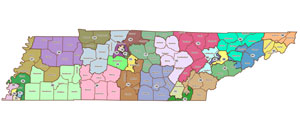Mike Knotts, Director of Government Affairs for the Tennessee Electric Cooperative Association
One man. One vote. It doesn’t get much simpler than that. Every citizen in the U.S. has the right to equal representation.
We may take this principle for granted, but it is one of the cornerstones of our form of government, a representative republic. What makes our system of government different from a democracy, however, is that our votes are cast in order to elect an individual who will represent us in a legislative body that deliberates and decides the people’s business. Our own vote does not directly decide the issue being debated.
So that means every American has a number of elected officials who represent them. At the federal level you are represented by two U.S. senators who are elected by the citizens of an entire state.You are also represented by one U.S. representative (frequently referred to as a congressman), who is elected to represent one of 435 geographical districts across the nation.These districts are apportioned in such a way that each district contains approximately the same number of citizens.
At the state level, you are represented by one state senator and one state representative. These individuals each represent differing geographic districts that contain a proportional number of the state’s citizens. Local governments are organized in a similar fashion, although there are differing methods by which they operate depending on the makeup of individual counties and cities.
While the news media today tends to pay lots of attention to the president of the United States or the goings- on of the Congress, the fact that state legislatures have the responsibility of determining how the representative districts are drawn is sometimes overlooked. Every 10 years, after completion of the U.S. Census, state representatives and senators take on the task of reapportioning the districts to guarantee equal representation for the people. They determine the boundaries for the U.S. House of Representatives districts in their states in addition to the State Senate and House lines.
While every district must be proportional in population to the other districts, are there a number of different ways to draw the lines to come up with an equal result?You bet. Does that mean politics may influence the outcome?You bet! Is that a bad thing? Well, assuming equal representation is achieved, no, I don’t believe so.
The General Assembly recently completed the process of redistricting the nine Congressional districts, 33 State Senate districts and 99 State House districts in Tennessee. This reapportionment was different, as it was the first time in history that the Republican Party has controlled the state Legislature during the process. However, the timing of the process was very similar to previous reapportionments.
There were certainly some winners and losers in the design of the districts. House Republican Leader Gerald McCormick told tnreport.com, “Any time you have 99 politicians carving up anything, you’re going to have some controversy, so I expect there will be some creative tension.” It would be impossible to please everyone’s wishes for how to draw the lines, and some in our state were indeed not happy. As former Speaker of the House Jimmy Naifeh was quoted (I can only assume tongue-in-cheek), “Just because I did it doesn’t make it right.” Well, like it or not, politics is a part of our governing process, and the party in control will certainly choose alternatives that benefit its vision for governance.
As an organization whose interests are primarily rural and suburban, we at the Tennessee Electric Cooperative Association are very interested in how these new districts will impact our ability to promote policies that keep your cooperative strong. Tennessee’s population has changed over the past 10 years, and the population growth in urban areas has been faster than that of our rural communities. Will this demographic shift make it more difficult to advocate for our electric co-op member- owners? Time will tell for sure, but an objective analysis shows that the maps appear to be drawn fairly and with an attempt to group together communities of like interest. Will some of our strongest supporters be impacted by these changes? Your votes at the ballot box will determine the answer to that question.
Because the new districts will take effect upon the conclusion of — not before — the November 2012 election, I encourage you learn what districts you live in.Maps are available on our website, www.tnelectric.org.
So what does all of this mean to you? This is an election year, and this fall when you go to the polls to vote (you are registered to vote, right?), you may very well find that you live in a new district or the person you are accustomed to representing you will be changing.




